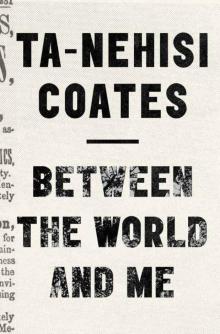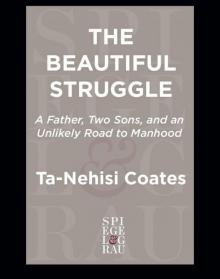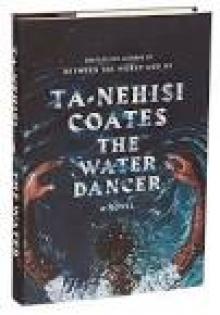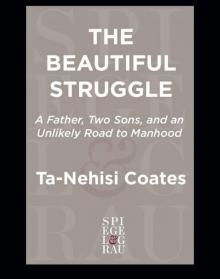- Home
- Ta-Nehisi Coates
Between the World and Me Page 2
Between the World and Me Read online
Page 2
To be black in the Baltimore of my youth was to be naked before the elements of the world, before all the guns, fists, knives, crack, rape, and disease. The nakedness is not an error, nor pathology. The nakedness is the correct and intended result of policy, the predictable upshot of people forced for centuries to live under fear. The law did not protect us. And now, in your time, the law has become an excuse for stopping and frisking you, which is to say, for furthering the assault on your body. But a society that protects some people through a safety net of schools, government-backed home loans, and ancestral wealth but can only protect you with the club of criminal justice has either failed at enforcing its good intentions or has succeeded at something much darker. However you call it, the result was our infirmity before the criminal forces of the world. It does not matter if the agent of those forces is white or black—what matters is our condition, what matters is the system that makes your body breakable.
The revelation of these forces, a series of great changes, has unfolded over the course of my life. The changes are still unfolding and will likely continue until I die. I was eleven years old, standing out in the parking lot in front of the 7-Eleven, watching a crew of older boys standing near the street. They yelled and gestured at…who?…another boy, young, like me, who stood there, almost smiling, gamely throwing up his hands. He had already learned the lesson he would teach me that day: that his body was in constant jeopardy. Who knows what brought him to that knowledge? The projects, a drunken stepfather, an older brother concussed by police, a cousin pinned in the city jail. That he was outnumbered did not matter because the whole world had outnumbered him long ago, and what do numbers matter? This was a war for the possession of his body and that would be the war of his whole life.
I stood there for some seconds, marveling at the older boys’ beautiful sense of fashion. They all wore ski jackets, the kind which, in my day, mothers put on layaway in September, then piled up overtime hours so as to have the thing wrapped and ready for Christmas. I focused in on a light-skinned boy with a long head and small eyes. He was scowling at another boy, who was standing close to me. It was just before three in the afternoon. I was in sixth grade. School had just let out, and it was not yet the fighting weather of early spring. What was the exact problem here? Who could know?
The boy with the small eyes reached into his ski jacket and pulled out a gun. I recall it in the slowest motion, as though in a dream. There the boy stood, with the gun brandished, which he slowly untucked, tucked, then untucked once more, and in his small eyes I saw a surging rage that could, in an instant, erase my body. That was 1986. That year I felt myself to be drowning in the news reports of murder. I was aware that these murders very often did not land upon the intended targets but fell upon great-aunts, PTA mothers, overtime uncles, and joyful children—fell upon them random and relentless, like great sheets of rain. I knew this in theory but could not understand it as fact until the boy with the small eyes stood across from me holding my entire body in his small hands. The boy did not shoot. His friends pulled him back. He did not need to shoot. He had affirmed my place in the order of things. He had let it be known how easily I could be selected. I took the subway home that day, processing the episode all alone. I did not tell my parents. I did not tell my teachers, and if I told my friends I would have done so with all the excitement needed to obscure the fear that came over me in that moment.
I remember being amazed that death could so easily rise up from the nothing of a boyish afternoon, billow up like fog. I knew that West Baltimore, where I lived; that the north side of Philadelphia, where my cousins lived; that the South Side of Chicago, where friends of my father lived, comprised a world apart. Somewhere out there beyond the firmament, past the asteroid belt, there were other worlds where children did not regularly fear for their bodies. I knew this because there was a large television resting in my living room. In the evenings I would sit before this television bearing witness to the dispatches from this other world. There were little white boys with complete collections of football cards, and their only want was a popular girlfriend and their only worry was poison oak. That other world was suburban and endless, organized around pot roasts, blueberry pies, fireworks, ice cream sundaes, immaculate bathrooms, and small toy trucks that were loosed in wooded backyards with streams and glens. Comparing these dispatches with the facts of my native world, I came to understand that my country was a galaxy, and this galaxy stretched from the pandemonium of West Baltimore to the happy hunting grounds of Mr. Belvedere. I obsessed over the distance between that other sector of space and my own. I knew that my portion of the American galaxy, where bodies were enslaved by a tenacious gravity, was black and that the other, liberated portion was not. I knew that some inscrutable energy preserved the breach. I felt, but did not yet understand, the relation between that other world and me. And I felt in this a cosmic injustice, a profound cruelty, which infused an abiding, irrepressible desire to unshackle my body and achieve the velocity of escape.
Do you ever feel that same need? Your life is so very different from my own. The grandness of the world, the real world, the whole world, is a known thing for you. And you have no need of dispatches because you have seen so much of the American galaxy and its inhabitants—their homes, their hobbies—up close. I don’t know what it means to grow up with a black president, social networks, omnipresent media, and black women everywhere in their natural hair. What I know is that when they loosed the killer of Michael Brown, you said, “I’ve got to go.” And that cut me because, for all our differing worlds, at your age my feeling was exactly the same. And I recall that even then I had not yet begun to imagine the perils that tangle us. You still believe the injustice was Michael Brown. You have not yet grappled with your own myths and narratives and discovered the plunder everywhere around us.
Before I could discover, before I could escape, I had to survive, and this could only mean a clash with the streets, by which I mean not just physical blocks, nor simply the people packed into them, but the array of lethal puzzles and strange perils that seem to rise up from the asphalt itself. The streets transform every ordinary day into a series of trick questions, and every incorrect answer risks a beat-down, a shooting, or a pregnancy. No one survives unscathed. And yet the heat that springs from the constant danger, from a lifestyle of near-death experience, is thrilling. This is what the rappers mean when they pronounce themselves addicted to “the streets” or in love with “the game.” I imagine they feel something akin to parachutists, rock climbers, BASE jumpers, and others who choose to live on the edge. Of course we chose nothing. And I have never believed the brothers who claim to “run,” much less “own,” the city. We did not design the streets. We do not fund them. We do not preserve them. But I was there, nevertheless, charged like all the others with the protection of my body.
The crews, the young men who’d transmuted their fear into rage, were the greatest danger. The crews walked the blocks of their neighborhood, loud and rude, because it was only through their loud rudeness that they might feel any sense of security and power. They would break your jaw, stomp your face, and shoot you down to feel that power, to revel in the might of their own bodies. And their wild reveling, their astonishing acts made their names ring out. Reps were made, atrocities recounted. And so in my Baltimore it was known that when Cherry Hill rolled through you rolled the other way, that North and Pulaski was not an intersection but a hurricane, leaving only splinters and shards in its wake. In that fashion, the security of these neighborhoods flowed downward and became the security of the bodies living there. You steered clear of Jo-Jo, for instance, because he was cousin to Keon, the don of Murphy Homes. In other cities, indeed in other Baltimores, the neighborhoods had other handles and the boys went by other names, but their mission did not change: prove the inviolability of their block, of their bodies, through their power to crack knees, ribs, and arms. This practice was so common that today you can approach any black person raised in the cities
of that era and they can tell you which crew ran which hood in their city, and they can tell you the names of all the captains and all their cousins and offer an anthology of all their exploits.
To survive the neighborhoods and shield my body, I learned another language consisting of a basic complement of head nods and handshakes. I memorized a list of prohibited blocks. I learned the smell and feel of fighting weather. And I learned that “Shorty, can I see your bike?” was never a sincere question, and “Yo, you was messing with my cousin” was neither an earnest accusation nor a misunderstanding of the facts. These were the summonses that you answered with your left foot forward, your right foot back, your hands guarding your face, one slightly lower than the other, cocked like a hammer. Or they were answered by breaking out, ducking through alleys, cutting through backyards, then bounding through the door past your kid brother into your bedroom, pulling the tool out of your lambskin or from under your mattress or out of your Adidas shoebox, then calling up your own cousins (who really aren’t) and returning to that same block, on that same day, and to that same crew, hollering out, “Yeah, nigger, what’s up now?” I recall learning these laws clearer than I recall learning my colors and shapes, because these laws were essential to the security of my body.
I think of this as a great difference between us. You have some acquaintance with the old rules, but they are not as essential to you as they were to me. I am sure that you have had to deal with the occasional roughneck on the subway or in the park, but when I was about your age, each day, fully one-third of my brain was concerned with who I was walking to school with, our precise number, the manner of our walk, the number of times I smiled, who or what I smiled at, who offered a pound and who did not—all of which is to say that I practiced the culture of the streets, a culture concerned chiefly with securing the body. I do not long for those days. I have no desire to make you “tough” or “street,” perhaps because any “toughness” I garnered came reluctantly. I think I was always, somehow, aware of the price. I think I somehow knew that that third of my brain should have been concerned with more beautiful things. I think I felt that something out there, some force, nameless and vast, had robbed me of…what? Time? Experience? I think you know something of what that third could have done, and I think that is why you may feel the need for escape even more than I did. You have seen all the wonderful life up above the tree-line, yet you understand that there is no real distance between you and Trayvon Martin, and thus Trayvon Martin must terrify you in a way that he could never terrify me. You have seen so much more of all that is lost when they destroy your body.
The streets were not my only problem. If the streets shackled my right leg, the schools shackled my left. Fail to comprehend the streets and you gave up your body now. But fail to comprehend the schools and you gave up your body later. I suffered at the hands of both, but I resent the schools more. There was nothing sanctified about the laws of the streets—the laws were amoral and practical. You rolled with a posse to the party as sure as you wore boots in the snow, or raised an umbrella in the rain. These were rules aimed at something obvious—the great danger that haunted every visit to Shake & Bake, every bus ride downtown. But the laws of the schools were aimed at something distant and vague. What did it mean to, as our elders told us, “grow up and be somebody”? And what precisely did this have to do with an education rendered as rote discipline? To be educated in my Baltimore mostly meant always packing an extra number 2 pencil and working quietly. Educated children walked in single file on the right side of the hallway, raised their hands to use the lavatory, and carried the lavatory pass when en route. Educated children never offered excuses—certainly not childhood itself. The world had no time for the childhoods of black boys and girls. How could the schools? Algebra, Biology, and English were not subjects so much as opportunities to better discipline the body, to practice writing between the lines, copying the directions legibly, memorizing theorems extracted from the world they were created to represent. All of it felt so distant to me. I remember sitting in my seventh-grade French class and not having any idea why I was there. I did not know any French people, and nothing around me suggested I ever would. France was a rock rotating in another galaxy, around another sun, in another sky that I would never cross. Why, precisely, was I sitting in this classroom?
The question was never answered. I was a curious boy, but the schools were not concerned with curiosity. They were concerned with compliance. I loved a few of my teachers. But I cannot say that I truly believed any of them. Some years after I’d left school, after I’d dropped out of college, I heard a few lines from Nas that struck me:
Ecstasy, coke, you say it’s love, it is poison
Schools where I learn they should be burned, it is poison
That was exactly how I felt back then. I sensed the schools were hiding something, drugging us with false morality so that we would not see, so that we did not ask: Why—for us and only us—is the other side of free will and free spirits an assault upon our bodies? This is not a hyperbolic concern. When our elders presented school to us, they did not present it as a place of high learning but as a means of escape from death and penal warehousing. Fully 60 percent of all young black men who drop out of high school will go to jail. This should disgrace the country. But it does not, and while I couldn’t crunch the numbers or plumb the history back then, I sensed that the fear that marked West Baltimore could not be explained by the schools. Schools did not reveal truths, they concealed them. Perhaps they must be burned away so that the heart of this thing might be known.
Unfit for the schools, and in good measure wanting to be unfit for them, and lacking the savvy I needed to master the streets, I felt there could be no escape for me or, honestly, anyone else. The fearless boys and girls who would knuckle up, call on cousins and crews, and, if it came to it, pull guns seemed to have mastered the streets. But their knowledge peaked at seventeen, when they ventured out of their parents’ homes and discovered that America had guns and cousins, too. I saw their futures in the tired faces of mothers dragging themselves onto the 28 bus, swatting and cursing at three-year-olds; I saw their futures in the men out on the corner yelling obscenely at some young girl because she would not smile. Some of them stood outside liquor stores waiting on a few dollars for a bottle. We would hand them a twenty and tell them to keep the change. They would dash inside and return with Red Bull, Mad Dog, or Cisco. Then we would walk to the house of someone whose mother worked nights, play “Fuck tha Police,” and drink to our youth. We could not get out. The ground we walked was trip-wired. The air we breathed was toxic. The water stunted our growth. We could not get out.
A year after I watched the boy with the small eyes pull out a gun, my father beat me for letting another boy steal from me. Two years later, he beat me for threatening my ninth-grade teacher. Not being violent enough could cost me my body. Being too violent could cost me my body. We could not get out. I was a capable boy, intelligent, well-liked, but powerfully afraid. And I felt, vaguely, wordlessly, that for a child to be marked off for such a life, to be forced to live in fear was a great injustice. And what was the source of this fear? What was hiding behind the smoke screen of streets and schools? And what did it mean that number 2 pencils, conjugations without context, Pythagorean theorems, handshakes, and head nods were the difference between life and death, were the curtains drawing down between the world and me?
I could not retreat, as did so many, into the church and its mysteries. My parents rejected all dogmas. We spurned the holidays marketed by the people who wanted to be white. We would not stand for their anthems. We would not kneel before their God. And so I had no sense that any just God was on my side. “The meek shall inherit the earth” meant nothing to me. The meek were battered in West Baltimore, stomped out at Walbrook Junction, bashed up on Park Heights, and raped in the showers of the city jail. My understanding of the universe was physical, and its moral arc bent toward chaos then concluded in a box. That was the message o
f the small-eyed boy, untucking the piece—a child bearing the power to body and banish other children to memory. Fear ruled everything around me, and I knew, as all black people do, that this fear was connected to the Dream out there, to the unworried boys, to pie and pot roast, to the white fences and green lawns nightly beamed into our television sets.
But how? Religion could not tell me. The schools could not tell me. The streets could not help me see beyond the scramble of each day. And I was such a curious boy. I was raised that way. Your grandmother taught me to read when I was only four. She also taught me to write, by which I mean not simply organizing a set of sentences into a series of paragraphs, but organizing them as a means of investigation. When I was in trouble at school (which was quite often) she would make me write about it. The writing had to answer a series of questions: Why did I feel the need to talk at the same time as my teacher? Why did I not believe that my teacher was entitled to respect? How would I want someone to behave while I was talking? What would I do the next time I felt the urge to talk to my friends during a lesson? I have given you these same assignments. I gave them to you not because I thought they would curb your behavior—they certainly did not curb mine—but because these were the earliest acts of interrogation, of drawing myself into consciousness. Your grandmother was not teaching me how to behave in class. She was teaching me how to ruthlessly interrogate the subject that elicited the most sympathy and rationalizing—myself. Here was the lesson: I was not an innocent. My impulses were not filled with unfailing virtue. And feeling that I was as human as anyone, this must be true for other humans. If I was not innocent, then they were not innocent. Could this mix of motivation also affect the stories they tell? The cities they built? The country they claimed as given to them by God?

 Between the World and Me
Between the World and Me The Water Dancer (Oprah's Book Club)
The Water Dancer (Oprah's Book Club) Beautiful Struggle
Beautiful Struggle The Water Dancer
The Water Dancer The Beautiful Struggle
The Beautiful Struggle